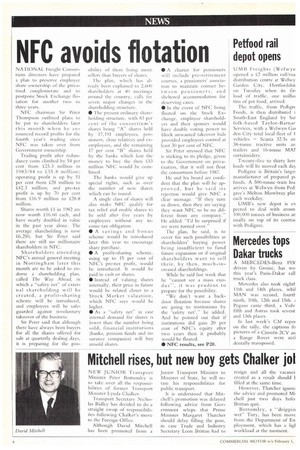NFC avoids flotation
Page 6

If you've noticed an error in this article please click here to report it so we can fix it.
NATIONAL Freight Consortium directors have prepared a plan to preserve employee share ownership of the privatised conglomerate and to postpone Stock Exchange flotation for another two to three years.
NFC chairman Sir Peter Thompson outlined plans to be put to shareholders later this month when he announced record profits for the fourth year's trading since NFC was taken over from Government ownership.
Trading profit after redundancy costs climbed by 54 per cent from S.:23.3 million in 1983/84 to 05.8 million; operating profit is up by 51 per cent from ,C8 million to .S:42.3 million; and pre-tax profit is up by 70 per cent from £16.9 million to S:28.8 million.
Shares worth in 1982 are now worth £16.60 each, and have nearly doubled in value in the past year alone. The average shareholding is now £6,250, but Sir Peter said there arc still no millionaire shareholders in NFC.
Shareholders attending NFCns annual general meeting in Nottingham later this month are to be asked to endorse a shareholding plan, called The Way Ahead, in which a "safety net" of external shareholding will be created, a profit-sharing scheme will be introduced, and employees will be safeguarded against involuntary takeover of the business.
Sir Peter said that although there have always been buyers for all the shares offered for sale at quarterly dealing days, it is preparing for the pos
sibility of there being more sellers than buyers of shares.
.11w plan, which has already been explained to 2,000 shareholders at 40 meetings around the country, calls for seven major changes in the shareholding structure.
• The present ordinary shareholding structure, with 83 per cent of the consortium's shares being "A" shares held by 17,191 employees, pensioners, close relatives and exemployees, and the remaining 17 per cent "B" shares held by the banks which lent the money to buy the then 03 million NEC would be combined.
The banks would give up special rights, such as over the number of new shares which can be issued.
A single class of shares will also make NEC qualify for tax relief and enable shares to be sold after five years by employees without any income tax obligation.
• A savings and bonus scheme would be introduced later this year to encourage share purchase.
• A profit-sharing scheme, using up to 15 per cent of NFC's pre-tax profit, would be introduced. It would be paid in cash or shares, • Instead of valuing shares internally, their price in future would be related closer to a Stock Market valuation, which NFC says would be higher.
• As a "safety net" in case internal demand for shares is lower than the number being sold, financial institutions (banks, pension funds and insurance companies) will buy unsold shares. • A charter for pensioners will include pre-retirement courses, a pensioners' association to maintain contact between pensioners, and sheltered accommodation for deserving cases.
• In the event of NEC being floated on the Stock Exchange, employee shareholders and Alien spouses would have double voting power to block unwanted takeover bids provided employees control at least 30 per cent of NFC.
Sir Peter stressed that NFC is sticking to its pledge, given to the Government on privatisation, that it will not float the consortium before 1987.
He and his board are confident that the plan will he approved, but he said its rejection would give NEC a clear message. "If they turn us down, then they are saying they want NEC to be no different from any company." He added: "I'd be surprised if we were turned over."
The plan, he said, is to cover for such possibilities as shareholders' buying power being insufficient to fund future expansion or if original shareholders want to sell their, by then, much-increased shareholdings.
While he said last week that he "cannot see a mass exodus", it was prudent to prepare for the possibility.
"We don't want a backdoor flotation because shares are going to institutions by the 'safety net'," he added. And he pointed out that if institutions did gain 20 per cent of NFC's equity after two years then it probably would be floated.
0 NFC results, see P20.




















































